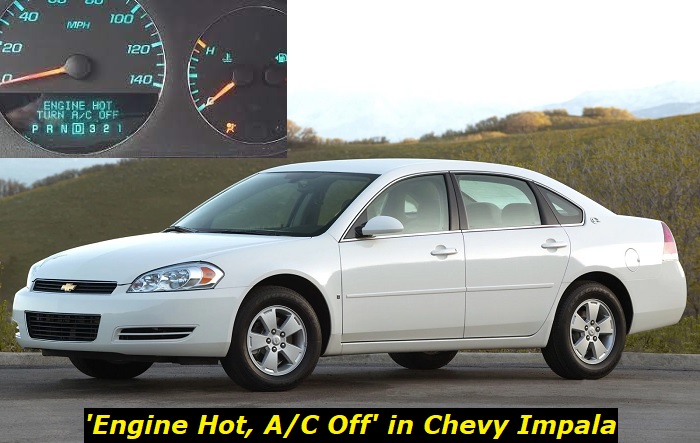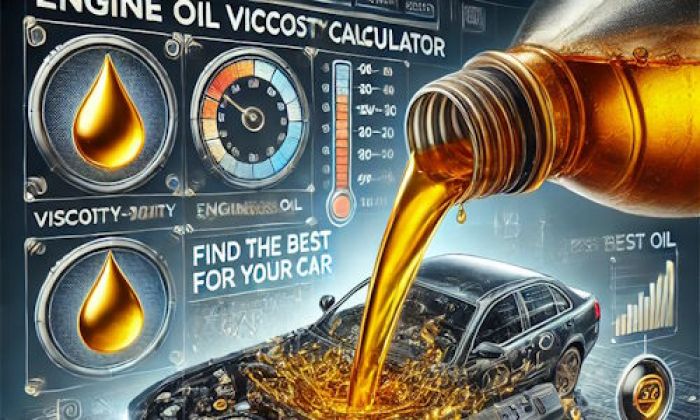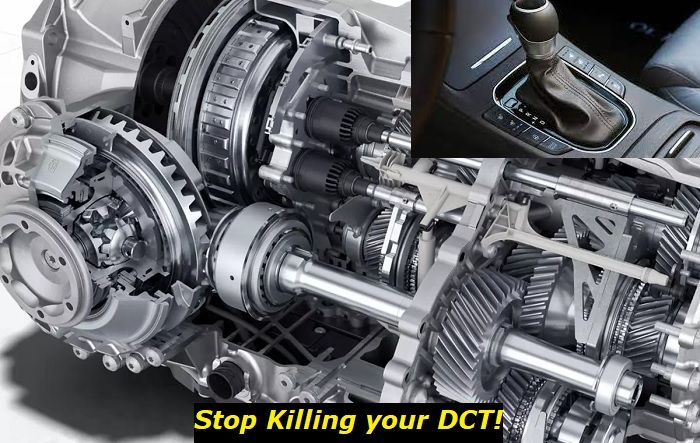The "Engine Hot, AC Off" alert can be disturbing if you have no idea what the message means. Every driver knows that driving a car with a hot engine is risky. The worrying part is that you are driving an overheating car and the AC is off.
This article explains what the warning means, why it appears, and how to deal with it safely. You will also learn the causes of an overheating engine and get simple tips to protect your Chevy from overheating.

What "Does Engine Hot, AC Off" Mean?
Your Chevy Impala displays the "Engine Hot, AC off" alert when the electric cooling fan fails. The car engine overheats when the cooling fan and other cooling system parts malfunction. The engine requires enough power to run the AC and other systems. When the fan fails, the AC goes off to reduce the load on the overheating engine.
The engine generates heat as it burns fuels to produce energy. If the fan is not cooling the engine, the temperature sensor sends a signal to the Electronic Control Unit (ECU). The unit sends a command in response to turn off the air conditioner and some other non-vital units to reduce the load on the engine and prevent further heating.
What Causes the Engine Hot, AC Off Warning?
Any malfunction in the radiator and cooling system will cause the engine to overheat. The "Engine Hot, AC Off" warning will appear until you solve the problem. Let us look at some of the mechanical issues in the cooling and radiator system that lead to overheating:
1) Low Coolant Level
A low coolant level is a leading cause of overheating problems in Chevy Impala and other car models. If the hose or radiator is leaking, the coolant level declines to a low level that cannot cool off the engine. Hence, your first response when you see the overheating warning should be to check the coolant reservoir.
2) Radiator Fan Failure
The radiator fan blows the engine's heat from the engine compartment to the outside. If the fan is not working properly, the hot air remains in the engine compartment causing the car to overheat. The radiator fan should be the next part you check after the coolant level when you get a hot engine warning.
3) A Faulty Temperature Sensor
The coolant temperature sensor alerts the ECU when the coolant temperature increases. The ECU turns the radiator fan on and off depending on the signal from the sensor. If the engine is overheating, the ECU turns on the radiator fan to cool the coolant, which cools the engine.
When the engine overheats, a broken temperature sensor cannot send a timely and accurate report. The temperature will continue to rise until the engine malfunctions or blows off.
4) Blown Head Gasket
The head gasket seals the engine chamber to build enough pressure to maintain the engine power. The head gasket also prevents the engine oil and coolant from leaking so that the engine does not overheat. If the head gasket blows, the coolant will leak and reduce to a small amount that cannot cool off the engine. The car may blow up if the engine keeps running without enough oil and coolant.
5) Faulty Thermostat Valve
A thermostat regulates the flow of the coolant into the engine chamber. As the engine generates heat, the thermostat valve opens to allow the coolant to flow into the engine compartment. However, if the valve is blocked or faulty, it will remain closed as the engine heats up.
6) Defective AC Compressor
The air conditioning system needs a functional compressor to convert the refrigerant from gas to liquid. A faulty compressor means the gas will not properly convert as it goes through the condenser. The AC will not send cold air to cool the car when you turn it on. Instead, the car overheats and makes a strange sound when you switch on the AC.
Several cooling system parts may malfunction or wear out simultaneously, causing the Chevy to overheat. Ensure that your mechanic checks the cooling system and replaces any worn-out parts.
Is It Safe to Drive with the Engine Hot Warning?
The "Engine Hot, AC Off" message is disturbing when driving. We have outlined several mechanical issues that can lead to an overheating engine, sending this alarm to your car display. Should you continue driving until you reach the nearest car garage or gas station? No, an overheating engine is risky. The Chevy may blow up as the engine temperature rises.
What To Do When Your Engine Overheats
When your engine overheats while driving, look for a safe place to park your car immediately. Do not keep on driving because you will strain and heat the engine further. Once the Chevy is parked, give the engine at least 20 minutes to cool down. Avoid opening the hood immediately after parking because the boiling water, steam, and hot metal may burn you.
Once the engine cools down, open the hood to the top and secure it with a rod. Locate the coolant reservoir and open it slightly to allow the heat the escape. Open the lid completely when all the pressure is off and check the coolant level. If the amount is below the minimum level, top up the reservoir without exceeding the maximum level mark in the reservoir.
It would be best if you had a suitable coolant at all times. However, if the car overheats before you can purchase its coolant, call your mechanic for assistance as the engine cools off.
It may be safe to drive the car to the mechanic's garage after topping up the coolant if all cooling system components are functioning. Give the engine a few minutes after refilling the coolant, and then drive slowly for a short distance. Be ready to pull over and call for help if the hot engine alert appears again.
It would be best to tow the car to the nearest garage if you are unsure about handling an overheating engine. Call a tow truck company as your engine cools. The company may send a mechanic to check on the engine before towing your car for further diagnosis.
A qualified mechanic will inspect all the cooling system and radiator parts for defects. However, you can also do a part of it when the engine overheats. Check the radiator and its hose for leaks as you refill the coolant.
Tighten the radiator clamps and hose to a perfect fit if you notice any leaks. You do not want the top-up coolant to leak and the engine to overheat again. In addition, if you notice a hole in the hose, use insulating tape to patch the hole. You can drive your Chevy Impala to a garage to confirm that every other component works correctly.
How To Prevent Recurring Overheating Problems
You have the necessary information to handle an overheating engine safely. However, you need to go a step further after resolving the issue to prevent a recurrence. You will also save repair and replacement costs when you do the following.
1. Inspect the Cooling System Weekly
Check the coolant level every week and fill the reservoir if the level is running low. In addition, check for leaks beneath while parking the Chevy on a flat surface. Inspect the radiator and hose for leaks and holes and repair them immediately. Check and tighten the radiator cap as well. If you drive for long hours every day, it is best to check the cooling system twice or thrice a week.
2. Regular Service
Do not skip any scheduled maintenance appointment with your mechanic. You are welcome to change the mechanic if the person or company does not pay enough attention to your car engine. Regular service includes changing the engine coolant and oil, which deteriorate over time. The mechanics will also check the radiator, air filters, and tires for the necessary replacement.
3. Avoid Parking Your Car under the Hot Sun
You may not find a perfect parking spot when running into a store. You may park in the sun for a few minutes. However, if you are parking for several hours, look for shade or an enclosed parking lot. The hot summer weather sometimes triggers the engine to overheat, even when all cooling components work perfectly.
4. Always Carry Extra Coolant
You will be stranded by the roadside if you lack extra coolant when the engine starts to overheat. You will not always be near a car shop or gas station. The shop may also lack a suitable coolant for your car. Buy and stock extra coolant in your car even if you are consistent with servicing your car.
5. Run the AC Every Week
Run the AC on the coolest setting for about 10 minutes every week. Keep the fan at the highest speed as the AC runs. The process helps the AC to maintain the pressure that keeps the compressor working properly. In addition, the AC requires a recharge every two years.
Conclusion
The "Engine Hot, AC Off" message appears when your engine overheats due to a cooling fan failure. Faulty components of the cooling system and a bad radiator may also cause the engine to overheat and trigger the alert. The warning is a sign that you need to stop driving and cool off the engine to determine the cause of the high temperature.
The good news is that you can safely handle an overheating emergency while waiting for professional help. We also recommend regular maintenance and inspection of the cooling system to protect your engine.
About the authors
The CarAraC research team is composed of seasoned auto mechanics and automotive industry professionals, including individuals with advanced degrees and certifications in their field. Our team members boast prestigious credentials, reflecting their extensive knowledge and skills. These qualifications include: IMI: Institute of the Motor Industry, ASE-Certified Master Automobile Technicians; Coventry University, Graduate of MA in Automotive Journalism; Politecnico di Torino, Italy, MS Automotive Engineering; Ss. Cyril and Methodius University in Skopje, Mechanical University in Skopje; TOC Automotive College; DHA Suffa University, Department of Mechanical Engineering






Add comment